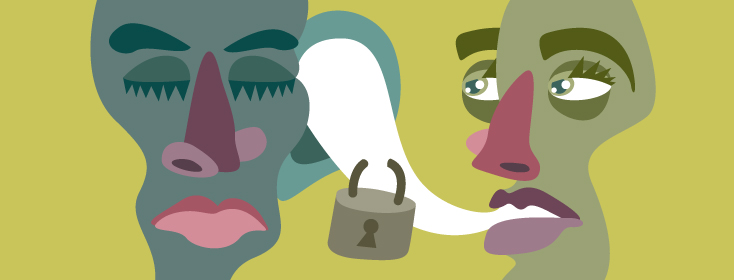Protecting Those We Love From Worry
I've always tried to be a protector. I've been that guy who goes into the fray to break up fights. I've been the sponge that has absorbed the stresses and frustration of those around me, the glue that holds things together when fractures threaten the foundation of a group. There have been too many times that I have kept information to myself and worked in silence to solve problems that frighten others. And while I have helped a few people along the way, there have been plenty of times when it was clear -- albeit too late -- that I should never have taken it upon myself to be that guy, certainly not alone.
Trying to present a calm exterior to loved ones
When I was diagnosed with lung cancer, and really even well before the actual diagnosis, it was only natural for me to shift into protection mode. I began spinning optimistic scenarios from the moment that an X-ray first revealed the mysterious mass in my lung. But inside, by the time my first biopsy revealed the true nature of my condition, I felt nothing but relief finally knowing what I was dealing with. In private, I had gone through all the stages of grief before anyone told me I had metastatic adenocarcinoma -- even while presenting a calm, confident, happy exterior to those around me.
It took a lot of self-evaluation to get to the point where I could realize that keeping everything inside was a poor choice for everyone. My father had been a very private, stoic person. But he erupted in rage when he reached his limit of keeping everything bottled up. Once I was into my treatment, I found that the mix of drugs made me potentially as eruptive as my father had been. My wife could not quite determine whether I was in denial or if I was hiding things from her. My daughter was able to sense more than she was being told and I began to fear alienating her. It took very little time before my inability to hide my own anger became problematic, even if it was quickly tamped down.
Walking a fine line
It seemed that protecting my family from worry was actually causing them more stress. I realized that there was a fine line to walk, that I would need to share my feelings and talk about my concerns, and certainly to discuss the actual prognosis of my treatment, all without raising undue drama or needless fears. Developmentally, there were things that could be appropriately discussed with my daughter, but as a child, it was important to let her lead the conversation as much as possible. She would let us know how much she needed to know, and as her understanding evolved so to would the questions she needed answered.
And my wife, she needed honesty so that she could feel safe; I could be optimistic all day long, but without a factual foundation, anything I might say could be construed as mere platitudes. There was no reason for me to overshare my fears, but I needed to be honest that I had them. There was no reason to share every single complaint, but I needed to include her in the big ones.
It may take time to get it right
It took some time to figure it all out, but it became clear that protecting against worry meant communicating well. There is no way to remove worry completely when living with cancer. Pretending there is nothing to worry about or trying to hide all the fears or anger or uncertainty will only lead down a very dark and twisting rabbit hole. Not everyone wants or needs the same level of detailed information. But to be confident, to feel in control of the situation (even a little bit), everyone needs the right amount of information. That's the right amount for each person, whatever it might be, and finding that level of detail is the challenge of preventing excessive worry.
It takes practice and no one is ever really going to get it right all the time, but we should be upfront about that, too. Cancer is a sloppy experience to go through and this understanding might be the key to success. Try as one might to protect against it, our loved ones will always worry about us. That's intrinsic to the problem: love brings caring, concern, and that little extra sadness at the thought of a different world once we are gone. But as impossible as it is to prevent entirely, we can minimize the worry of others without getting rid of the care and concern they offer, simply by communicating better.
Editor’s Note: We are extremely saddened to say that on October 21, 2018, Jeffrey Poehlmann passed away. Jeffrey’s advocacy efforts and writing continue to reach many. He will be deeply missed.

Join the conversation